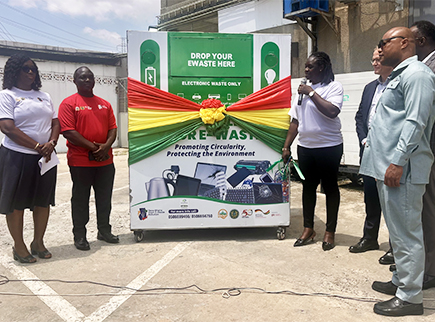Ghana has launched a national e-waste collection drive to promote responsible disposal and support the country’s transition to a circular and sustainable economy.
The initiative aims to provide safe and convenient avenues for citizens to dispose of old or unused electronic devices for recycling.
Speaking at the launch in Accra to mark International E-Waste Day 2025, Madam Suweibatu Adam, Chief Director of the Ministry of Environment, Science and Technology (MEST), said the event symbolised Ghana’s collective commitment to environmental protection and sustainable development.
She said that the Ministry’s policy direction was to shift from a linear “take–produce–dispose” model to a circular economy where materials are reused, repaired, refurbished, and recycled to retain value.
“This shift is central to Ghana’s Medium-Term National Development Policy Framework and supports our international commitments under the Sustainable Development Goals, particularly SDG 12 on Responsible Consumption and Production, and SDG 13 on Climate Action,” she said.
Madam Adam announced that MEST, in collaboration with the Environmental Protection Agency (EPA), was developing Extended Producer Responsibility (EPR) legislation to expand coverage beyond electrical and electronic equipment to include packaging, plastics, and textiles.
She said that the Ministry was finalising a National E-Waste Management Policy to address emerging waste streams such as electric vehicles, lithium-ion batteries, and renewable energy storage systems, which require safe handling and recycling.
Professor Nana Ama Brown Klutse, Chief Executive Officer of the EPA, said the collection drive marked another milestone in Ghana’s efforts to protect the environment and promote sustainable livelihoods.
She cited the 2024 National E-Waste Inventory Report, prepared by the EPA under the World Bank–funded Africa Environmental Health and Pollution Management Programme, which indicated that Ghana generated approximately 650,000 tonnes of e-waste in 2023, equivalent to 19.24 kilograms per capita—a nearly fourfold increase since 2009.
Prof. Klutse said the EPA, with support from the World Bank, was establishing modern collection, dismantling, and refurbishment centres in Accra, Koforidua, and Tamale to serve as regional hubs for repair, material recovery, and safe handling of hazardous components.
As part of the initiative, she said ten branded e-waste collection containers would be installed at major shopping and commercial centres, beginning with Melcom branches at North Industrial Area, Madina, and Spintex.
“This means Ghanaians, including you and me, can now be part of the solution. The next time you replace your phone or microwave, don’t throw it away—drop it off to be recycled responsibly,” she urged.
Prof. Klutse emphasised that the success of the drive depended on collective action, public education, and stakeholder collaboration, particularly with the media.
“The e-waste collection and recycling sector is being built today with purpose, strategic partnerships, and people at the centre. Let us all press forward together,” she stated.
The initiative will be piloted in Accra, with plans for nationwide rollout. It will offer drop-off points and a free pick-up option for bulky items via the GH-Waste App.
In a message delivered on his behalf, Mr Anthony Akwetea-Mensah, Administrator of the E-Waste Fund, said the drive would serve as a practical take-back system, providing citizens with safe and convenient means to return used or obsolete electronic products.
He stressed that the initiative was not intended to displace existing private collectors but to complement their work by creating a structured, transparent, and sustainable national system.
“We are building a framework that formalises informal collectors, strengthens recycling businesses, and ensures all electronic waste is handled in an environmentally sound manner,” he stated.
The initiative is spearheaded by MEST, EPA, the E-Waste Fund, and partners including GIZ and Melcom Ghana Limited.
Categories
Editor's Pick
Ghana launches national e-waste collection drive to promote circular economy


https://shorturl.fm/k9Ipq